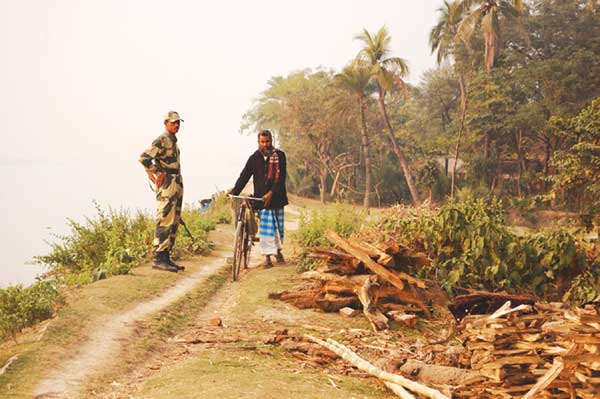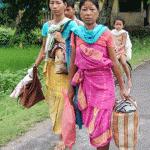Muhammad Jamil Rehman, a trader, who had come to India to get his mother treated, was one of those, who preferred to stay back, for thorough health check-ups of his mother in India, where medical facilities are cheap and best in the Asian countries. “I am not willing to take any risk in my country, where medical aid is of very poor quality and not sustainable or proper for each and every diseases. It’s true that our Indian visas are valid for only next seven days but I have no way, I will go back to pavilion only after my mother’s treatment is over (in fact, until my mother becomes fit) not before that,” said Jamil.
…in India, now-a-days, ‘infiltration’ is one of the most burning and sensitive problems.
After he entered India through the International Border Check Post (IBCP) at Mahadipur under Malda district of West Bengal State he stayed in a lodge at district headquarters town, Malda. Even, he had spoken over telephone to his wife and child at Dhaka, the capital of Bangladesh, that in future he would come to India for anybody.
It is a usual picture on India-Bangladesh international border, where each and everybody likes Muhammad Ashraful Rezzak, a Bangladeshi citizen with his family, is in a queue of 40 numbers to 50 numbers of people and is waiting for clearance to cross over to the Indian side for better treatment to his ailing wife, Rubina Biwi and daughter, Rukaiya Khatun.
But practically, the Rezzak family always keeps in mind that India- Bangladesh international border is always a controversial border and sensitive with issues such as immigration, smuggling, aggressive religious fundamentalism, human trafficking and insurgency activities. Therefore, they neither want to stay for more days after completion of the treatment nor do they want to take any risk before the aforesaid international boundary is sealed for an indefinite time after or before any kind of violence that escalates on the above international boundary for the above reasons. Most of the time, the situation tells different stories. A good number of Bangladeshi citizens have stayed in India illegally in the name of better medical treatment. . Like Muhammad Rukun Zaman, resident of Rajsahi District of Bangladesh, who had come to Kolkata, the capital of West Bengal, for the treatment of his son (who is 8-years old and is suffering from a respiratory problem) in a private hospital. They were forced to go back home in Bangladesh, as they found that their visa had expired.
The infiltrators, who are entering India, offer a good amount of money (bribe) for availing of these opportunities.
“My son’s treatment is incomplete, only 65 per cent has been cured, the doctor told me, ‘I must go there once again and complete the treatment as well as the course of medicine simultaneously. So, I have decided that I will definitely go to India for the sake of my son’s better life. There, the physicians are too good,” said an emotionally Muhammad Zaman.
Indeed, in India, now-a-days, ‘infiltration’ is one of the most burning and sensitive problems. It has been taking place in diversified ways. The recent government and non-government organisations’ report exposes that many Bangladeshis are illegally sneaking into India through various authorised (International Border Gate—IBG) ways as patients to receive ‘free medical treatment’ from the Indian state’s not only government hospitals as well as the medical health centres but also private medical institutions. Some of these foreign nationals go back to their country and some remain here for days, months and years together. The most astonishing fact is that the hospitals or medical units, which are run by the Indian central or state governments, not only supply the medicines to the foreign nationals but also arrange for their food and lodging. In this context, the foreign nationals are admitted and they’re getting this help from the above medical units with the help of a below poverty line certificate and this happens because of some touts and elected representatives, who help them a lot in an illegal way. The infiltrators, who are entering India, offer a good amount of money (bribe) for availing of these opportunities.
RP Singh, the Deputy Inspector General (DIG) of Border Security Force (BSFI) of the international border areas got disgusted and remarked: “This is quite untamable and disgusting. Everyday, a good number of Bangladeshi people illegally enter Indian territory in the guise of patients with fake medical certificates as documents and create unnecessary problems.” He added, “The Bangladeshi foreign patients are also carrying Below Poverty Line (BPL) certificates which provides them an opportunity of free medical treatment.
Around 50,000 Bangladeshis come to India every year for better medical treatment only.
The certificate is provided only when a candidate’s yearly income does not exceed Rs. 2,000. Certificates are required to obtain from local Member of Legislative Assembly of Bangladesh (MLAB) or officers of block or district level of Bangladesh.”
Supporting the fact, one of the local physicians at Agartala, the capital of Tripura, averred, “In my health centre, 25 per cent to 30 per cent of the patients are Bangladeshis and they hide their real identity and enlist their name and address in the registered book as an Indian to avail better treatment. But, if you can see them, you may easily know that their language and dresses indicate their real identity. While as a doctor and as a people of India, we take care of them on a humanitarian ground, Border Security Force and the Indian Police Force (IPF), including the people also behave with them sympathetically. Because, India has a culture of Atithi Devo Bhavah which means: ‘Guest is God and we should take care of them properly.”
“It is true that Bangladeshis come to India for better medical treatment. Bangladeshi patients are available in the Tripura state’s hospitals like Agartala Government Medical College Hospital, Sonamura Hospital, both are in West Tripura district, while others in North Tripura District’s Kailasahar Government Hospital etc,” affirmed a renowned senior journalist of Agartala town, Manas Paul.
“Around 50,000 Bangladeshis come to India every year for better medical treatment only. If you go to the Indian High Commission offices at Chittagong, Dhaka, and Rajshahi, Bangladesh, you will see more than 50 per cent Bangladeshi nationals are in a queue for visa purposes for medical treatment to India, apart from tourism, pilgrimage, study, business, cultural activities, visiting relatives, wedding or funeral purposes, etc”, emphasised an Indian Research Analysis Wing (RAW) official.
Only a few illegal infiltrators disclose their intention openly, that they’ve entered India for better medical treatment facilities, because they are very poor, while the rest are unknown.
“It is a fact, that if you go to the IBCPs that lie on the Indo-Bangla international boundary on both side, you will find that most of the IBCPs are full of Bangladeshi people, who are waiting to enter India and to return from India with valid passports and visas for and after medical treatment. Not only that even from India, maximum doctors come to Bangladesh to heal our country’s patients through better medical diagnosis,” confirmed one of the officials of the Federation of Bangladesh Chambers of Commerce & Industry (FBCCI).
However, the above reports have exposed that more than 500 Bangladeshi nationals receive free medical treatment every month. Of them only 15 per cent come under the BPL category. Neither any law nor any agreement is there for allowing foreign nationals to have free treatment in India. Yet it goes on. On enquiry, it is known from BSF sources that 20 per cent to 30 per cent of the Bangladeshi infiltrators are arrested in the India Bangladesh International Border areas during their entry into Indian land with a view to getting free medical health treatment, without valid or proper documents.“See, it is a serious matter for us. We do not know the exact motive of the illegal Bangladeshi immigrants. Only a few illegal infiltrators disclose their intention openly, that they’ve entered India for better medical treatment facilities, because they are very poor, while the rest are unknown. Therefore, it is difficult to say how many Bangladeshi nationals come to India for better medical purposes, but, we will look into the matter seriously,” emphasised Biswanath Chowdhury, West Bengal’s Minister for Jails & Social-Welfare (of Revolutionary Socialist Party [RSP] Member of Legislative Assembly [MLA] from Balurghat Assembly Constituency of South Dinajpur district, earlier known as West Dinajpur district.
“Indeed, Bangladesh lacks good health services. There is neither any hospital nor any health centre. Therefore, whenever anybody falls ill or becomes the victim of any disease, he or she is required to go to a nearby health centre of India—especially, the populace of the International Border Villages (IBVs) that lie on the Indo-Bangla international boundary. Even the Bangladeshi inhabitants use foreign currency to buy their good health service from India.





